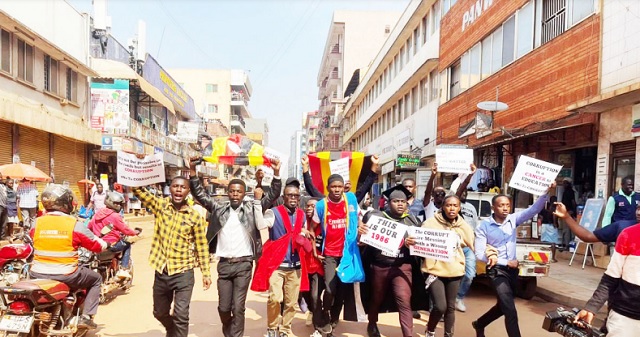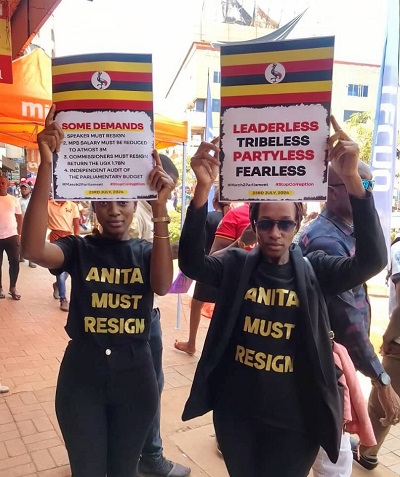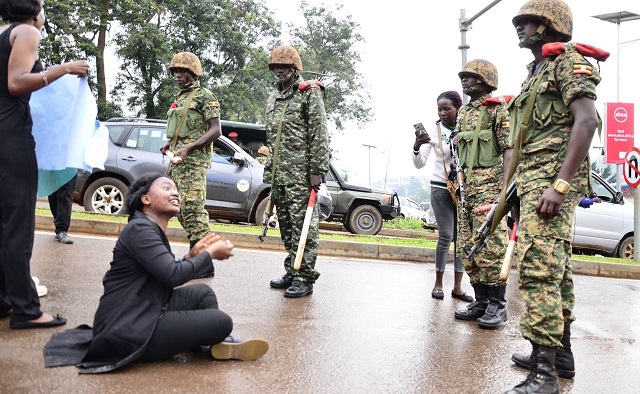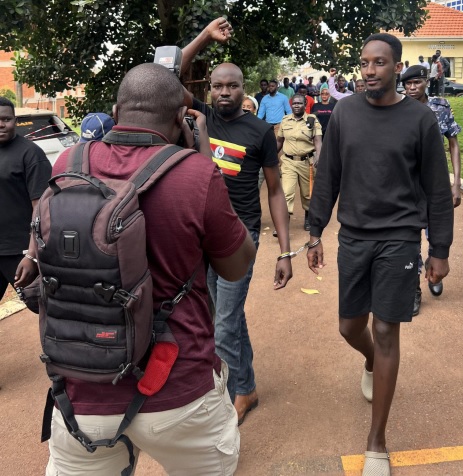
Did July 23 mark the start?
COVER STORY | IAN KATUSIIME | Tired of endless corruption, groups of Ugandans took to the streets under the hashtag #March2Parliament. It was also to express their anger and dissatisfaction against an unaccountable political system they say does not work for majority of citizens.
In a tactful protest organised on X and rolled out on the streets of Kampala city, Ugandans experienced an awakening and consciousness that put President Museveni on notice, forced Speaker of Parliament Anita Among to suspend plenary sessions after recess, and kept MPs in panic.
There were protests on July 23 and again on July 25. This led to questions about whether they could become sustained eruptions of marches at a parliament where corruption and theft of public funds is glorified and has no consequences. Corruption is now so widespread that nearly every government department has been implicated in a corruption scandal; from State House to Ministry of Finance to Police and national hospitals.
Protestors planned the march to parliament a month in advance with placards that read #StopCorruption #AnitaMustResign in a demonstration that was “leaderless, party-less and tribe-less.”
Opposition leader Bobi Wine, and President of the National Unity Platform (NUP) made a clarification that neither he nor the party was organising the protests whose date was set in June while parliament was under recess.
Parliament reconvened on July 23 on the D-Day charging the atmosphere as Ugandans waited to take on the legislature that has been described as a ‘House of Deals.’
The #March2Pariament campaign has mirrored events in Kenya where Gen Z protestors stormed Parliament in the wake of the now dropped finance bill that was passed by MPs. Kenyans have sustained protests for a month with President Ruto making concessions after concessions to appease the protestors demanding more, including his resignation. Ruto remains defiant on the latter.
Ugandan protestors are making the same demands such as the resignation of Speaker Among. The first term Speaker has provoked indignation and a wave of protests for her implication in several cases of theft of public funds to furnish an extravagant lifestyle that, according to exposes, has her buying Shs10m dresses, the latest Range Rovers, erecting a mega sized mansion, and making unclear donations and withdrawing hundreds of millions of shillings to fund political activities.
Although protester presence on the street was less, the movement was not dissimilar to the one that has gripped Kenya where young protestors have forced the Kenyan President to withdraw an unpopular finance bill, fire his cabinet, and cut back on public spending.
`We are not your grandchildren’
A citizen-led effort #UgandaParliamentExhibition has been key in getting the MPs to face the music. But public anger crystallised after a political event in Lwengo District with Ugandans torching up their MPs online with a new hashtag #TextTheThief in reaction to the endemic corruption at Parliament.
At the Lwengo event that proved to be a catalyst for the protests, a corrupt-fest ensured as Speaker Among and MPs stood in solidarity with Lwengo Woman MP Cissy Najjuma, then under remand for corruption, when they said the corruption she was being charged for was for the benefit of her constituents.
The revelations at the event triggered condemnation from Ugandans at their MPs who gloated about theft of taxpayers’ money.

Ugandans were further enraged when President Museveni stated on X that the protests were “foreign-funded” and were planning other dangerous activities in a continuation of the gas lighting that has characterised Museveni’s engagement with those who rise up to his rule.
But what drew the ire of Ugandans was the use of the term “Bazzukulu” which was firmly denounced by the young Ugandans who took part in the protests online and offline.
John Martin Muwanguzi posted, “This habit of infantilising us and thinking that we lack agency MUST stop. We aren’t your grandchildren. We are citizens that are demanding accountability from elected officials, and that includes YOU. Uganda is not your household.”
Aisha Nassanga hit back: “I AM NOT YOUR MUZZUKULU. ba Jajja baffe tubamanyi atte tebeyissa batyo.”
@Iamogutudaudi said, “I have been lucky to be a Muzukulu to 2 grandfathers, Musisi and Isabirye. All have had some similar things that shape my view of a grandfather.”
Museveni’s reaction once again revealed the detachment between him and the young population most of whom are below 35. A sample of those arrested reveals that the average age was 28—about five years out of university–and probably still looking for employment.
Hundreds arrested, abducted
On the highly anticipated Tuesday of July 23, Gen Z protestors were spread out in different parts of Kampala; Nasser Road, Oasis Mall, and across Parliamentary Avenue where they marched with banners demanding for the resignation of the Speaker, and parliament commissioners involved in illegal service awards.
In spite of police sealing off roads leading to the House, protestors managed to reach within striking distance and hold a sit down protest shouting “AnitaMustResign.”
Police dutifully hauled away to the nearest police station the peaceful protestors who behaved like they came ready for arrest or worse.
There were emotional appeals as Gen Z protestors put out posts to their kin in case they do not make it back alive due to what has been the norm of protests happening in Uganda: security forces killing scores with bodies lying on the streets. But the vice the youth marched against directly affects the hapless men and women in uniform whose poor pay and living conditions are always in the news.
More than 100 Ugandans have been arrested or abducted with over half of them in unknown locations. Some of those arrested include FaizaFabz, Thomas Kanzira, Bernard Olupot, Baron Edgar, Ruth Nalunkuma, Abigail Kalenda, Denis Pato.
Nalunkuma, Kalenda and Pato were arrested in Ntinda as they were set to address journalists about the protests in a puzzling overreach of security personnel in halting the march against corruption. The three were granted bail two days later.

Others arrested include Robert Kiwanda, Jolly Nyirambabazi, Hamzah Karungi, Peter Arnold Ssegwanyi, Galen Mambule, Isaac Mukiibi, Muhammed Ssentongo, Alex Twikirize, Edward Lutaaya and Nelson Tamale.
The second day of the demonstrations saw similar events play out with a group of 15 protestors starting from Nasser Road with placards ‘Anita Must Resign’ marching to parliament. They were intercepted by police just before they turned on the road to parliament.
After being arraigned at Buganda Road Court, the protesters were charged with ‘common nuisance’ and being ‘idle and disorderly’ the latter, a charge that was struck down by the Constitutional Court in 2022. The protestors who were remanded to Luzira Prison were scheduled to appear in court on different dates earliest being July 30.
Mark Keron Wamala, one of the few released, was dumped at the Northern Bypass in the dead of night. The arrestees have received support owing to how the protests have galvanised Ugandans besides the torment caused by debilitating prison conditions.
The #March2Parliament protests showed an unprecedented level of organisation among Uganda’s youthful generation as they countered a 38-year-old government led by a 79-year-old President who has ruled longer than most of them have existed. The movement has revealed a deep seated anger and resentment against the government.
The demonstrations have been a coordinated activity with roles distributed among various teams. Some focused on welfare of those detained and injured during clashes with Police and others on legal representation and medical support. This included preparing food for protestors and for those imprisoned.
There was also mobilisation with volunteers coming forward to stand surety for those being charged. Only a National ID is required for standing surety. Most activities required money and other resources and there appears to have been teams around that.
There were also volunteers, like the Uganda Law Society, that came in handy providing defense for Jared Opio, Charles Tumwebaze and Nana Namanya and Annet Niwafrika, peaceful protesters who were arrested and charged with ‘Public Nuisance’ at Buganda Road Court and remanded to Luzira prison until August 1 when they will be due for a bail application.
Eron Kizza, a renowned human rights lawyer led the defense of another group of protesters; Yub Denis, Batabaale Ronald, Otule Isaac, Kajubi Martin, Kikwiyakare Humphrey, and Oburu Paul. They were arrested with Simon Wandukwa, Abdulaziizi Bweete, Margaret Nattabi and Brian Mooli. They have also been charged with Public Nuisance and remanded until August 6.
The protest had an online portal for all those arrested and detained that showed their faces, full names, point of arrest, gender, X handle. The link also shows where they were last seen and the location where they are being held.
Act now or else
On the first day of the protests on July 23, the House sat and it was not without drama. Some MPs boldly stood up and denounced corruption despite attempts by Deputy Speaker Thomas Tayebwa to downplay the heat of corruption engulfing his boss, Speaker Among.
Aringa South MP Yorke Alioni read the Deputy Speaker the Riot Act. “The world is aware that there is corruption in this parliament. We want this matter to be debated? Why are you running away from this debate?”

He pummeled him further: “You’re meant to be neutral to give space to all of us equally. Why are you making us suffer…running through this country looking for signatures to debate this matter of corruption in this parliament?
Alioni told Tayebwa and his boss Among to come clean since they have been named several times in acts of corruption.
Joel Ssenyonyi, Leader of Opposition, cried out. “There seems to be double standards within this institution of ours called the parliament of Uganda. Rt. Honorable Speaker, there are citizens that came to parliament with placards protesting against one of our colleagues the Honorable Theodore Ssekikuubo. They came the first day they were ushered in nicely with their placards,” he said.
“I thought that in the same way you received those who were protesting against one of our honorable colleagues, you would also receive the young people in the same manner, because they have concerns as citizens of this country,” he added.
For Butambala MP Muwanga Kivumbi, the writing is on the wall. “Our cardinal fundamental role is to sniff out what concerns Ugandans. And unflinchingly come to this House and debate those matters,” he stated.
“In the whole of East Africa, not only in Uganda but in the neighboring Kenya, young people are raising their voices. They are speaking boldly and acting like so,” he said.
Kivumbi said Parliament should go out of its way to listen to young people lest a Kenya situation happens. “Otherwise for us to gloss over and laugh over them, one day they will overwhelm those mambas. They will overwhelm those forces. And descend to our homes, to our places of work, and say we no longer represent them,” he warned.
A number of MPs have been arrested and are facing graft-related charges. More than 30 legislators have faced interrogations over embezzlement of funds.
In addition, four Parliament Commissioners have also been under fire since they allotted themselves Shs1.7bn in a dubious “service awards” scheme. At the centre of the saga is Mathias Mpuuga, former Leader of Opposition, who was awarded Shs500m for his work in the position to the chagrin of his party and the public.
On July 25, reports came through that a censure motion against the commissioners had gathered all the required 177 signatures to boot the MPs but there is dim hope because the Speaker has already ordered the clerk to suspend plenary sessions.
The Ugandan parliament is now a besieged house barricaded from the public with Siad Barre Avenue and Parliament Avenue; the two roads to the House manned by security checkpoints with restrictions n who can access it.
 The Independent Uganda: You get the Truth we Pay the Price
The Independent Uganda: You get the Truth we Pay the Price




I was told that, in the olden days, when thick clouds of locusts would descend on the land, decimating all the crops leaving the land bare causing famine, rather than sit idly by, entire communities would take their drums outside and beat them as loud as they could while loudly commanding the locusts to leave in the desperate hope that the noise would make the locusts uncomfortable and cause them to leave or at least confuse them enough to interrupt the destruction of crops.
They say history repeats itself.
Are we not beating our drums as loud as we can, hoping to chase away the locusts?
I commend my fellow patriots for beating their drums as loudly as they can, with the intention of causing change that will benefit all of us as Ugandans for generations to come.
Rather than beating drums (or worse, doing completely nothing except watching the worsening destruction unfold before our eyes), aren’t there more effective means of dealing with the locusts?
Perhaps the beating of the drums will draw the attention of those who have the knowledge and capacity to introduce more effective ways of permanently dealing with the locusts?
Maybe new airtight anti corruption legislation of the seriousness applied by the minds who drafted the anti homosexuality bill? And we become like those countries where people automatically resign on allegations of corruption to allow for proper investigations, and once found guilty… and the fate of the corrupt is that which will make a sobering example of them and send a shocking message out to the whole country and the whole world, that here in Uganda we don’t joke when it comes to managing corruption… for us there are no sacred cows when it comes to managing corruption, the anti corruption systems are so strong that nobody can save you from that very terrible fate if you are foolish enough to engage in corruption of any magnitude for any duration of time… and even if you know of any corruption and you remain quiet about it, there will be nobody who can save you from the permanent anti corruption systems firmly set in place.
The kind of anti corruption systems that would strongly impress on the public on all levels, until it becomes common knowledge and even part of our continuously evolving culture, that corruption in whatever shape size or form is completely unacceptable, and to engage in corruption, no matter who you are or how connected you are, is to commit suicide.
When that happens, Ugandans will never see locusts ever again, and we will never have to beat our drums as loud as we can in a desperate attempt to chase the locusts from our skies and our gardens, hoping to avert the impending famine, the resulting loss of life, and the gradual destruction of our nation.
Instead, we will flourish and thrive and become a beacon of hope for the rest of the continent and the whole world, as we have done many times in the past when we decided to become very serious about particular issues of major concern. We can assume that position of excellence and global leadership yet again. Best of all, we will become self sufficient, truly independent, and properly immune to things of neocolonialism.
And all those who have been beating their drums to chase away the locusts will have played their part.
Perhaps the beating of drums to chase away locusts was not as irrational as we may be lead to believe. It may have been one of the many effective technologies that we lost to the demonization of indigenous practices during colonization. Perhaps they were not attempting to scare away the locusts using noise, perhaps they were communicating with those in the wind, sending out a desperate plea for their urgent intervention. Such practices were demonized by colonizers using the church. The same church that sold us down the river during colonization, is the same church now selling us down the river again by providing a powerful platform for corrupt officials to attempt sanitizing their corrupt ways, adding insult to injury.
We are told of lavish ceremonies involving speeches of religiosity that attempt to formalize ungodly agreements (covenants, really), and frighteningly awkward arrangements with the church involving obscene amounts of money from questionable sources.
They must be hoping that the Son of the Most High will ignore their actions or just forgive them instantly and continue turning the other cheek… forgetting that the time when He resorted to physical violence, was when he was angered by those who turned His Father’s house into a den of thieves. (Matthew 21:12-17). If you want to see he Son of Man cutting wires properly… you continue turning His Father’s house into a den of thieves… you will see. Very soon, you will see.
Continue frustrating our fervent prayers for our country by availing the church for corrupt officials to use it as a platform for their religious blackmail as they preach to us from sacred pulpits about how they are being victimized by those patriots among us who are demanding accountability, which by the way is our right as citizens… we will completely stop going to your shamelessly corrupt churches that stay selling us down the river and we go back to beating our drums… and the locusts will go, and our nation will thrive and flourish.